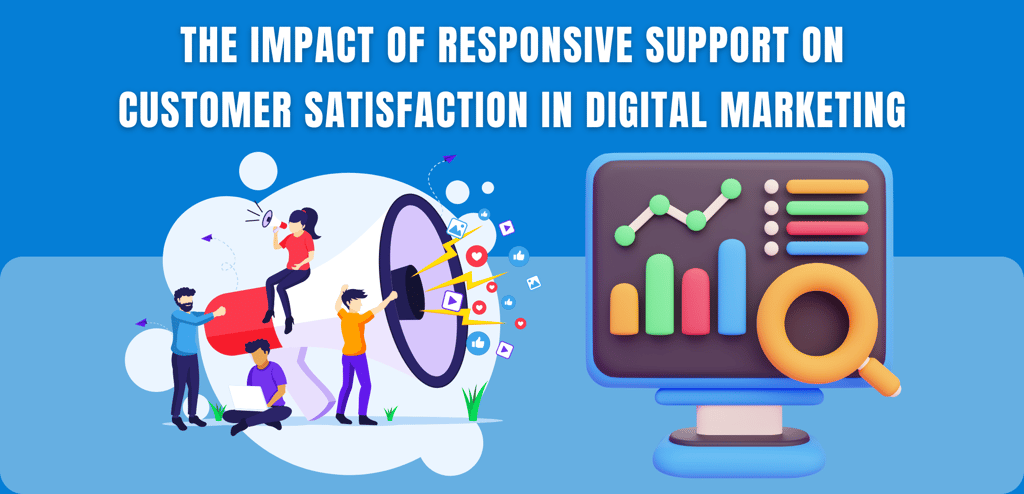
The Impact of Responsive Support on Customer Satisfaction in Digital Marketing
By AZ Konnect Team
10/25/20245 min read


In today's fast-paced digital landscape, customer expectations are higher than ever. With countless options available at their fingertips, consumers expect businesses to be available, responsive, and helpful at every stage of their journey. This is especially true in the field of digital marketing, where competition is fierce, and customer satisfaction can make or break a business. One of the key factors that significantly influence customer satisfaction is responsive support. Providing timely and effective assistance not only resolves immediate issues but also fosters long-term relationships, brand loyalty, and trust.
In this post, we'll explore how responsive support impacts customer satisfaction in digital marketing and why it’s essential for businesses looking to thrive in the digital age.
1. The Role of Customer Support in Digital Marketing
Customer support in digital marketing extends far beyond answering basic inquiries or solving technical issues. It plays a critical role in the entire customer experience, influencing everything from first impressions to long-term engagement. In an industry where communication is often digital and instantaneous, businesses must prioritize responsive, high-quality support to maintain a competitive edge.
Responsive support is integral to:
Building Trust:
When customers feel that their questions or concerns are addressed promptly, it builds confidence in your business. Trust is particularly important in digital marketing, where clients may have complex needs and require assurance that their marketing campaigns are in capable hands.
Maintaining Customer Engagement:
A lack of responsive support can lead to frustration, disengagement, and even lost business. On the flip side, effective support keeps customers engaged with your brand and services, enhancing the overall customer journey.
Enhancing Customer Retention:
Satisfied customers are more likely to continue working with your business or recommend it to others. Responsive support can directly impact retention rates by ensuring customers feel valued and heard.
2. Speed and Efficiency: The Key Components of Responsive Support
When it comes to customer support, speed and efficiency are crucial. In digital marketing, campaigns and strategies often move quickly, and clients expect timely responses to their queries or issues. Delays in support can not only frustrate customers but also affect the performance of their marketing efforts.
Key Benefits of Fast and Efficient Support:
Immediate Issue Resolution:
Whether it’s a website issue, an ad campaign concern, or a question about analytics, customers need timely solutions. The faster you can address these problems, the more satisfied your clients will be.
Improved Customer Experience:
Fast, responsive support creates a seamless experience for the customer. When they know they can count on your team for quick resolutions, it enhances their overall perception of your brand.
Boosting Client Confidence:
In the fast-evolving world of digital marketing, clients rely on service providers to navigate complex tools and platforms. Fast, efficient support reinforces your expertise and gives clients confidence that their needs are in good hands.
3. Personalized Support Enhances Satisfaction
While speed is important, the quality and personalization of support are equally critical. Digital marketing involves a diverse range of services—from SEO and social media management to PPC advertising and email marketing—each client’s needs will vary. A one-size-fits-all approach to support won't work. Customers appreciate when support teams take the time to understand their unique situation, industry challenges, and business goals.
Benefits of Personalized Support:
Tailored Solutions:
Rather than providing generic responses, personalized support helps address specific issues with customized solutions. For instance, a client facing declining website traffic will appreciate support that focuses on their unique SEO strategy rather than a general troubleshooting guide.
Building Stronger Relationships:
Personalized support helps businesses build stronger relationships with clients. When customers feel like they are being treated as individuals, rather than just another ticket number, they are more likely to develop a positive, long-term relationship with your brand.
Higher Satisfaction and Loyalty:
Personalized support not only resolves problems more effectively but also creates a positive emotional connection with customers. When customers feel understood and supported, their loyalty to your business increases.
4. Multi-Channel Support for Maximum Reach
In the digital age, customers expect support to be available through a variety of channels, including email, live chat, phone, and social media. Offering multi-channel support not only makes it easier for customers to reach you but also ensures that they can choose the method that best suits their preferences.
Advantages of Multi-Channel Support:
Increased Accessibility:
Customers can choose how they want to communicate with your support team, making it more convenient for them to get help when they need it.
Real-Time Assistance:
Channels like live chat and social media offer real-time responses, which is particularly beneficial for time-sensitive issues such as campaign performance or platform glitches.
Broader Customer Engagement:
Offering support across multiple platforms increases your reach and ensures that you can meet customers where they are, whether they prefer traditional communication channels like email or modern platforms like social media.
5. Proactive Support: Preventing Issues Before They Arise
Responsive support isn’t just about reacting quickly when problems arise—it also involves being proactive. Proactive support anticipates customer needs and addresses potential issues before they become major problems. In digital marketing, where even minor errors can impact campaign results, proactive support is a game-changer.
Examples of Proactive Support in Digital Marketing:
Regular Performance Updates:
Offering clients regular updates on their marketing campaigns' performance keeps them informed and reassured, reducing the need for them to reach out for updates. This also shows that you’re closely monitoring their accounts and working to optimize results.
Preemptive Issue Alerts:
Notifying customers of potential issues before they escalate—such as changes in social media algorithms or an upcoming platform update—demonstrates your commitment to keeping their marketing efforts running smoothly.
Offering Educational Resources:
Providing clients with educational content, like guides or tutorials on digital marketing trends, can empower them to handle smaller issues independently. This enhances their satisfaction while also reducing the support team’s workload.
6. Measuring and Improving Support Performance
To consistently deliver responsive support, it’s crucial to measure your performance and make improvements where necessary. Customer satisfaction surveys, support ticket resolution times, and feedback forms are great tools for evaluating how well your support team is meeting customer needs.
Ways to Measure and Improve Support:
Track Key Metrics:
Metrics like average response time, resolution time, and customer satisfaction scores provide insight into how well your team is handling support requests. Identifying bottlenecks or areas where response times are slow allows you to make adjustments for better efficiency.
Customer Feedback:
Regularly soliciting feedback from customers about their support experience helps identify strengths and areas for improvement. Implementing changes based on customer feedback shows that you value their input and are committed to delivering excellent service.
Ongoing Training:
Providing your support team with continuous training on new tools, platforms, and digital marketing trends ensures they stay up to date and can offer the most relevant and informed assistance to clients.
7. The Long-Term Impact of Responsive Support on Customer Loyalty
The benefits of responsive support go beyond resolving immediate issues—it has a long-term impact on customer loyalty and brand reputation. When customers consistently receive timely and personalized support, they are more likely to stay loyal to your brand, recommend your services to others, and become repeat customers.
In digital marketing, where businesses rely on recurring contracts, project renewals, and client referrals, maintaining a high level of customer satisfaction through responsive support can directly contribute to long-term business success.
Long-Term Benefits:
Increased Customer Retention:
Satisfied customers are more likely to continue working with your business and renew contracts, ensuring a steady stream of revenue.
Positive Word-of-Mouth:
Happy customers are more likely to recommend your services to others, helping you grow your client base organically.
Enhanced Brand Reputation:
Responsive support is a key factor in building a strong brand reputation. When customers know they can rely on you for quick, effective help, your brand’s reputation for quality service will grow.
Conclusion
In the world of digital marketing, where competition is fierce and customer expectations are high, responsive support is no longer a nice-to-have—it’s a necessity. Fast, personalized, and multi-channel support not only resolves issues quickly but also builds trust, improves customer satisfaction, and enhances long-term loyalty.
By prioritizing responsive support and continuously refining your approach, your digital marketing business can stand out from the crowd, delivering exceptional service that keeps clients coming back time and time again.
Subscribe To Our Newsletter


